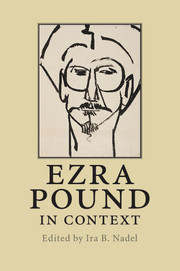Book contents
- Frontmatter
- Contents
- Notes on contributors
- Acknowledgements
- Chronology
- List of abbreviations and note on references to The Cantos
- Introduction
- Part I Biography and works
- Part II Historical and cultural context
- 16 The classics
- 17 Provençal and the troubadours
- 18 Dante and early Italian poetry
- 19 America
- 20 Venice
- 21 London
- 22 Paris
- 23 Rapallo and Rome
- 24 Pisa
- 25 Imagism
- 26 Vorticism
- 27 Music
- 28 Visual arts
- 29 Confucius
- 30 The Orient
- 31 Little magazines
- 32 Publishing and publishers
- 33 Modernism
- 34 Fascism
- 35 Anti-Semitism
- 36 Gender and sexuality
- 37 Race
- 38 Travel
- Part III Critical reception
- Further reading
- Index
36 - Gender and sexuality
Published online by Cambridge University Press: 05 July 2014
- Frontmatter
- Contents
- Notes on contributors
- Acknowledgements
- Chronology
- List of abbreviations and note on references to The Cantos
- Introduction
- Part I Biography and works
- Part II Historical and cultural context
- 16 The classics
- 17 Provençal and the troubadours
- 18 Dante and early Italian poetry
- 19 America
- 20 Venice
- 21 London
- 22 Paris
- 23 Rapallo and Rome
- 24 Pisa
- 25 Imagism
- 26 Vorticism
- 27 Music
- 28 Visual arts
- 29 Confucius
- 30 The Orient
- 31 Little magazines
- 32 Publishing and publishers
- 33 Modernism
- 34 Fascism
- 35 Anti-Semitism
- 36 Gender and sexuality
- 37 Race
- 38 Travel
- Part III Critical reception
- Further reading
- Index
Summary
INTRODUCTION
Writing to his mother from London in 1908, the young aspiring poet, Ezra Pound, reflected on his attitudes toward her:
for some years past I have been so over busied contemplating abstractions of the marvelous working of my mental internal workings that I have not taken time to regard you as an individual with a certain right to think, hold ideas, etc. for yourself. & not necessisarily [sic] ideas in accord with my own. It seems to me that this action or rather lack of it on my part rather demands some sort of apology on my part which I here tender.
(Moody, 72)This endearing admission is paradigmatic: it balances the poet's attention to his “marvelous” imaginative inner life with the belated recognition of the woman's – in this case Isabel Pound's – right to individuated selfhood. And once the recognition occurs it leads to remorse and an apology. These three elements can be discerned in Pound's exchanges with women and in his depictions of “woman”; although we don't necessarily find all three in every case.
In the tradition of Dante Alighieri, often mediated by the Pre-Raphaelite poets such as Dante Gabriel Rossetti, Pound construed female friends as muses who nourished his internal workings. On occasion he would recognize their right to autonomy, treating them as equals, especially if they were poets he approved of, or editors, or publishers. And on occasion he would need to express remorse for failing to consistently acknowledge that his own agendas could cause them pain. However, it might also seem as if he sometimes continued to be “out of touch with his time” when it came to issues of gender and sexuality.
- Type
- Chapter
- Information
- Ezra Pound in Context , pp. 402 - 411Publisher: Cambridge University PressPrint publication year: 2010
- 1
- Cited by

